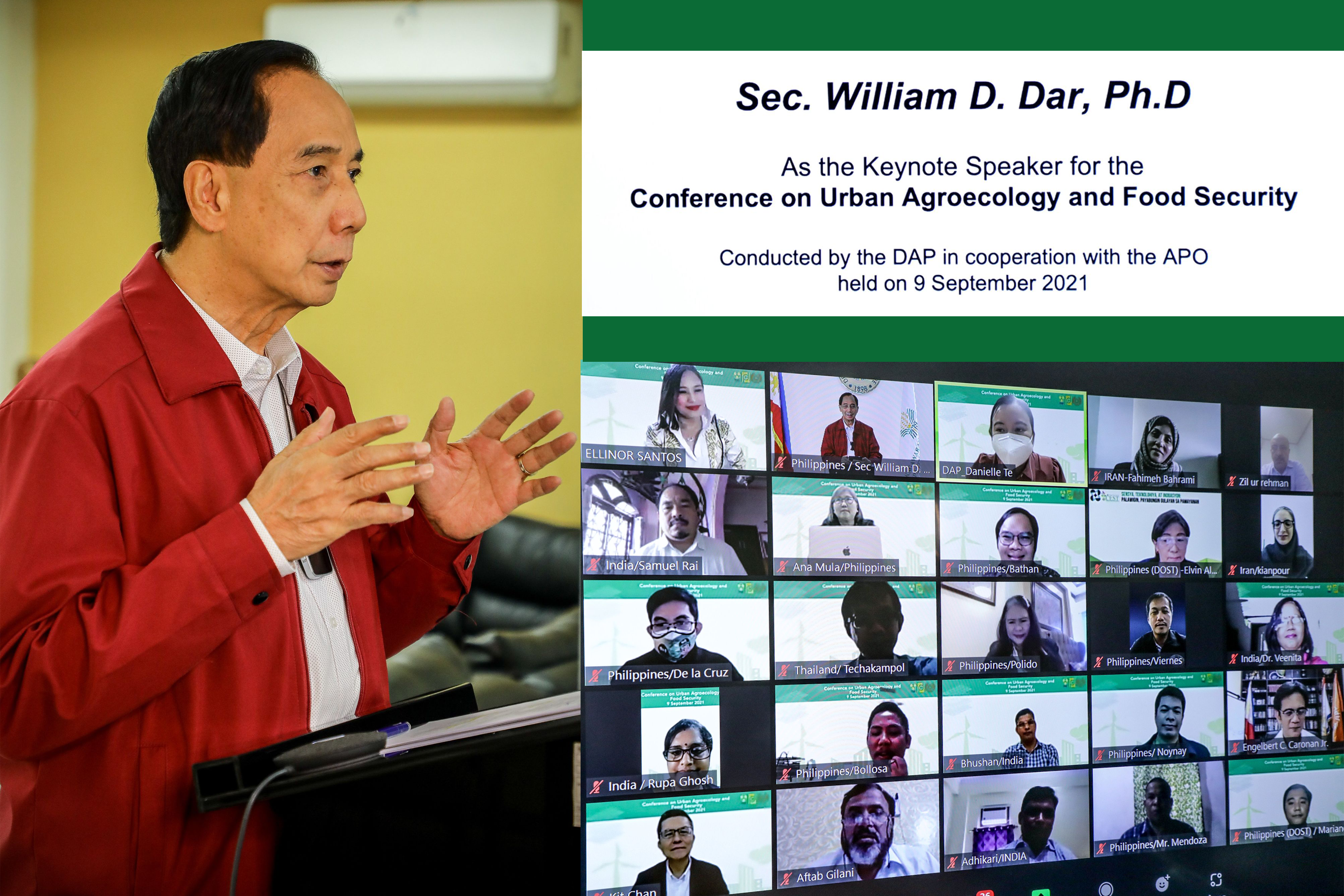
Agriculture Secretary William Dar highlighted the importance of urban agriculture (UA) in ensuring food supply amidst the pandemic during the “Conference on Urban Agroecology and Food Security” held on September 9, 2021.
The conference, organized by the Development Academy of the Philippines (DAP), in cooperation with the Asian Productivity Organization (APO) to gather key stakeholders from Malaysia, Japan, Indonesia, and Philippines, aimed to campaign for the whole-of-society approach to drive transformative changes and establish sustainable, technology-based and agile food systems across countries, as well as build solution-based mechanisms for urban agriculture.
In his message, the agri chief stressed the effects of the Covid-19 pandemic on the national food supply, especially in non-producing areas.
“With economies constrained by lockdowns, we worried about food security in urban areas dependent on food produced in the countryside. With the supply chain disruptions, urban areas with sparse lands used for agriculture were menaced by the rising costs of food,” Sec. Dar said.
The secretary added that the necessary quarantine measures made urban food supplies acutely sensitive to demand shocks. Since then, public interest in growing fruit and vegetables at home has soared.
“This is true not only in the developing world, but also in developed nations, as well,” he said.
Sec. Dar stressed that the global health crisis not only increased the enthusiasm and opportunities for urban agriculture but also increased the need to sustain urban farming, especially in the developing world.
During the conference, the agri chief shared three things from the Philippine UA experience.
First, urban farms can provide impoverished communities with a steady and practical supply of nutritious food.
“In fact, a report issued by the Food and Agriculture Organization estimates that urban farms can produce up to 15-20 percent of the global food supply each year,” he said.
Second, urban farms help local governments reduce the consequences of disruption in any part of the food value chain.
“While we may not yet have fully mapped out the effects of COVID-19 on the world’s hunger, one fact is by now evident. The food shortages seen in many urban communities around the world would not have been as keenly felt if the urban poor grew food right where they live,” Sec. Dar said.
Third, while urbanization is generally regarded as one of the biggest threats to biodiversity, environment-friendly, sustainable agriculture in towns and cities can boost the abundance and diversity of wildlife.
The agri chief stressed that urban agriculture increases the population of natural pollinators such as bees, birds, and bats. He said that their existence is beneficial in the overall health of ecosystems.
“All these reasons and more should compel us to encourage greater food production in our towns and cities. I am pleased to report that — in the Republic of the Philippines — the government’s response to this imperative has been elevated into a long-term national policy,” he said.
He also shared the activities of the Department under the UA program including distributions of planting materials through the Bureau of Plant Industry (BPI), trainings on vertical gardening, hydroponics, and urban aquaculture through the Agricultural Training Institute (ATI) and partnerships with various agencies such as Philippine Council for Agriculture, Aquatic and Natural Resources Research and Development of the Department of Science and Technology (DOST-PCAARRD), and establishment of urban farms in collaboration with the Bureau of Corrections (BOC).
The agri chief said that the Department will continue to expand its national program on UA and will continue to forge mutually beneficial arrangements with local and foreign partners to address their gaps in logistics, funding, and research.
“That is because we believe ensuring self-sufficiency and food security in the urban communities of the developing world requires a concerted effort. The pandemic is a global problem — and common sense tells us that there can be no solution to a global problem without global cooperation,” Sec. Dar concluded. ### (Kristel Joyce Merle, DA-AFID)













